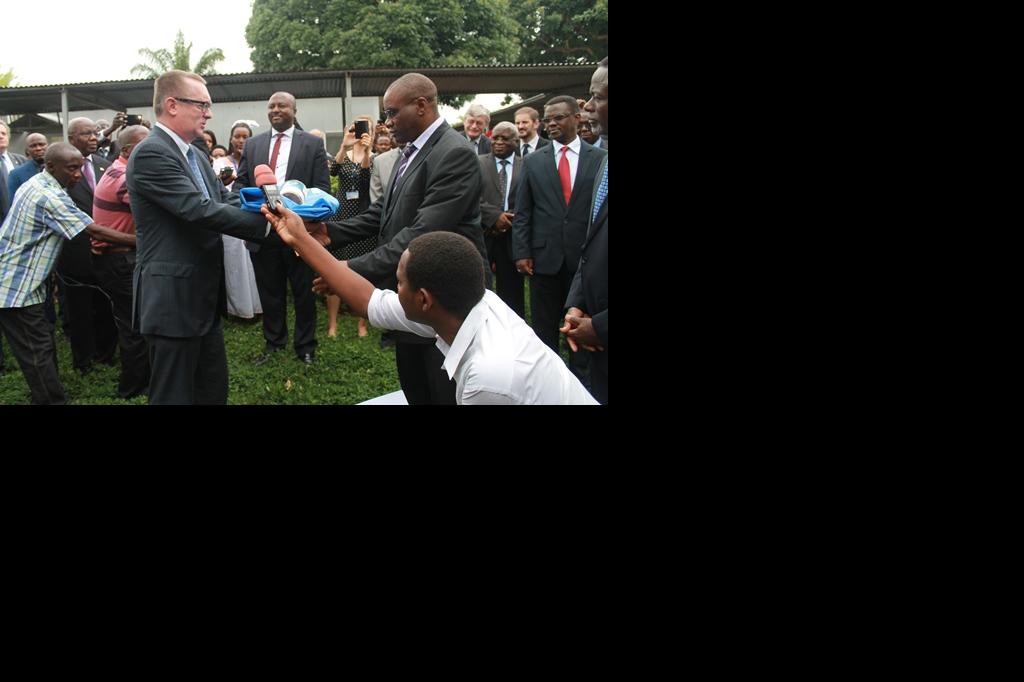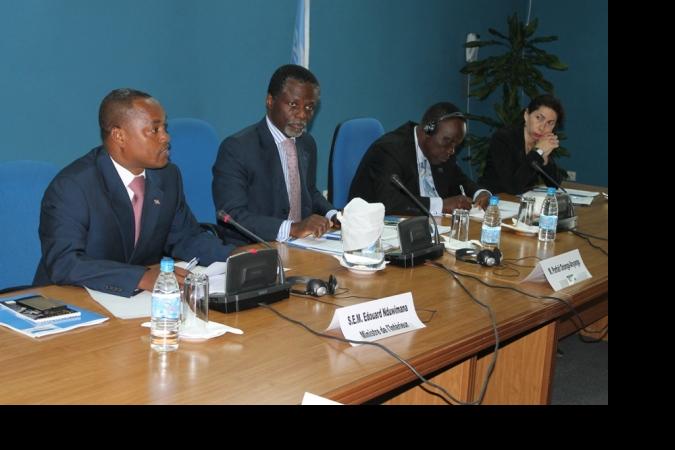28 January 2014 - While Burundi had made substantial progress in overcoming formidable political, security and development challenges, the Government must show more “visionary leadership” than ever in protecting those gains as it worked to complete its peacebuilding process, the senior United Nations official in that country told the Security Council today.
Parfait Onanga-Anyanga, Special Representative of the Secretary-General and Head of the United Nations Office in Burundi (BNUB), said he had “a heart full of hope and optimism” for Burundi’s future, as he presented the latest report of the Secretary-General (document S/2014/36), which is structured around eight benchmarks and the findings of a strategic assessment mission that visited Burundi from 27 to 29 November 2013.
Highlighting progress, he said that, on 19 and 20 December, the President had gathered political actors and civil society representatives in the National Assembly for consultations on a future constitution that international observers had called “a great moment of harmony”, evoking the spirit of the historic Arusha agreements intended to found a common destiny. In its march towards sustainable peace, Burundi had held elections in 2005 and 2010, and had established its national armed forces, he added.
Yet, the peacebuilding process was incomplete, he said, noting the fragility of essential indicators. Providing Burundi with all possible opportunities to win the war against poverty was vital to consolidating peace and social cohesion. Furthermore, political actors meeting from 27 to 29 November to assess the road map adopted last March had recognized the need to tackle such challenges as the “climate of distrust” among key political stakeholders, the absence of an agreed process to review the constitution and persistent violence among young people affiliated with certain parties. For such reasons, the Secretary-General had called for sustained political support.
He went on to say that, if well organized, elections to be held in 2015 could mark the end of the peacebuilding process, a goal that the peacebuilding plan signed in December should facilitate. While the Secretary-General recognized Burundi’s desire for national ownership of the process, his recommendation was based on the evaluation of peacebuilding benchmarks, and took into account the fact that a country team would not be able to absorb the mission’s tasks at the present time.
“This work is not over,” he continued, welcoming Burundi’s efforts to work towards a more peaceful, prosperous future, while encouraging national dialogue so as to ensure that its efforts would lead to greater national ownership. No doubt, Burundi would show the “visionary leadership” required to tackle those challenges, and the Council would remain by its side, he said. “At the right time, we will reap an abundant harvest if we do not give up.”
Paul Seger ( Switzerland), Chair of the Burundi configuration of the Peacebuilding Commission, recalled that his report of last June had noted the “exceptional” progress the country had made. “The work we have to do now is to stay the course,” he said, emphasizing the need to maintain the spirit of the Arusha Peace and Reconciliation Agreement and the Geneva Declaration.
Describing Burundi as being in the “final kilometres of a marathon”, he stressed the need to conduct the constitutional review in a consensual manner, and to hold inclusive elections in 2015. Some opposition leaders had expressed their readiness to take part in the polls to ensure that the mistakes of 2010 were not repeated, he said. Property issues must also be resolved for the sake of unity, and properties seized since 1972 should be restored. Justice must be carried out fairly and equitably, he said.
Underlining the importance of a United Nations political mission remaining in the country, he said the African Development Bank and the World Bank viewed such support as necessary because it served as a guarantee of investment. Indeed, Burundi required United Nations support in the final stage of peacebuilding, and while mindful of the Government’s right to end the BNUB mandate, it was important to maintain continuity through the presence of a country team, rather than creating an artificial deadline for the mission’s withdrawal.
Laurent Kavakure, Burundi’s Minister for Foreign Affairs and International Cooperation, recalled that his Government had appeared before the Council a year ago to call for the progressive handover of the mission’s duties to a country team over a “more than sufficient” 12-month period. Yet, the Council had extended its mandate a second time, until 15 February, with the adoption of resolution 2090 (2013). Burundi had agreed to apply that resolution and bring its activities into line with the United Nations Charter, and had reiterated, in a 16 August 2013 note to the Secretary-General, its desire for a February 2014 drawdown.
He went on to recall that, in his 26 September 2013 response, the Secretary-General had noted that the Council believed the parties would arrive at a solution to carry out the last phase of Burundi’s peacebuilding process, an approach that would allow the progressive handover of BNUB activities to a country team. The President of Burundi had welcomed that cooperation on 31 December 2013, and had reiterated his commitment to upholding resolution 2090 (2013), which set forth the end of the mission’s mandate in February 2014. Support for the 2015 elections could be provided by the United Nations country team and other partners, he said, emphasizing that a link between elections and the need to maintain BNUB was not justified. Electoral monitors could be deployed before, during and after the electoral period, he added.
As for security, he said that the professionalization of the armed forces was a long-term process that could continue with the country team. Burundi’s deployment of troops to Haiti, Côte d’Ivoire and Somalia was just one sign of their professional standing. In the area of transitional justice, the Government had launched a process to establish a truth and reconciliation commission. Touching on other successes in such areas as governance, land ownership, human rights, regional integration and development, he said the country team would need to apply the national peacebuilding plan, which had resulted from consultations among the Government, civil society, the international community and the United Nations.
“Peace and security are a reality in my country,” the Minister asserted, stressing that the dialogue among political stakeholders was a clear sign of ongoing efforts to ensure the success of the elections. As for the proposal to close BNUB in 2015, he said Burundi supported a six-month transition to drawdown the mission and progressively hand over its duties to the country team. A resolution should be adopted to close the mission, in accordance with resolution 2090 (2013). The Secretary-General should ensure that the country team was operational by 2015 and that a plan was set forth to establish an electoral monitoring team to be deployed before, during and after 2015 elections, he said.
The meeting began at 10:20 a.m. and ended at 11:20 a.m. (Source: DPI)






